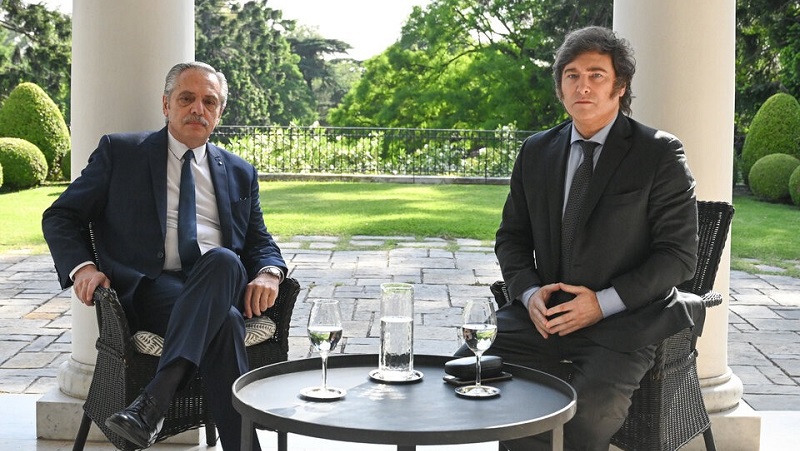
A government in decline that receives unexpected help for its “cultural battle.” Editorial from “El Círculo Rojo,” a program on La Izquierda Diario that is broadcast every Thursday from 10 p.m. to midnight on Radio Con Vos 89.9.
- Before Fabiola Yañez’s serious accusation against Alberto Fernández took center stage in public discussion, the agenda was filled with the multiple crises of Javier Milei’s government: the labyrinth into which the economic scheme entered; the worsening of the social situation; signs of growing unrest in broad sectors of society; criticism from very important businessmen such as Paolo Rocca; a worsening of internal conflicts within La Libertad Avanza and the distancing of a key ally for the official coalition such as Mauricio Macri. A distancing that is increasingly turning into a confrontation.
- The visit of the six deputies of La Libertad Avanza to genocidal military officers convicted of crimes against humanity in the Ezeiza prison added another scandal that caused divisions in the heart of the ruling party; in Congress there is a risk of failure of resolutions such as the increase in reserved funds for the SIDE, the lists of the judges proposed for the Court (Ariel Lijo) or a proposal for an increase in retirement benefits could advance (as may happen) that would put Milei in the uncomfortable position of having to veto it.
- In addition, certain indicators in public opinion began to show that the stability of Milei’s image was slowly but steadily deteriorating.
- The Ad Hoc consultancy, which tracks digital conversation and the public agenda in general, recorded that in July, 24.56% of the main headlines of Clarín and La Nación were about the economy; the previous month it had been only 18%. It is true that newspapers are no longer read as they used to be and the covers do not have the same impact, but their priorities continue to dictate the agenda of other platforms. Neither the Copa América nor the controversial election in Venezuela made the economic agenda invisible. According to the same consultancy, the negativity associated with this agenda is growing, Luis Caputo’s fame is increasing, but not his positive image. In short, there was a certain loss in the management of the agenda that is essential for the Government. Not only the topics were imposed, but also the tone in those topics.
- Today, another piece of information was released that could make this situation worse: inflation in the City of Buenos Aires had its second consecutive month of acceleration in July: it was 5.1%. In general, this figure anticipates what the Indec may report next Wednesday, the 14th, regarding the national CPI.
- In an article published in La Política Online, Javier Correa (from the consulting firm Ad Hoc) adds one more element: the end of novelty (that is the title of the article). The loss of that ephemeral charm that novelty has. It is a government that accelerated everything, including the movements against it; an administration that has already been scanned and whose main exponents are no longer so mysterious. The time for “discovery” has passed. In this framework, two more indicators must be taken into account: the “index of guilt,” that is, who has the greatest responsibility for the current economic situation? The need to not shrink the rearview mirror on the performance of the previous government. Well, the results already register an increase in the number of people who attribute the main responsibility for the current economic situation to Milei’s government. Another indicator is the crossroads between the approval of the government and the approval of the economic management. In this there are important gaps (such as those measured by the University of San Andrés) that can reach up to 12 points (to the detriment of economic management, obviously). In some ways this speaks of expectations and reality.
- This whole scenario is also crossed by the reactivation of social conflict (teachers in several provinces, Córdoba and Neuquén as notable cases; oil workers’ strike in strategic centers; struggles against layoffs such as the Frigorífico Rioplatense, strike in the ceramics union or conflicts such as the tire or Posadas Hospital), the march of the CGT, CTA and “social movements” was the most moderate – for a change – of all these actions.
- Well, in that context the scandal and the complaint against Alberto Fernández for physical violence against his ex-wife broke out.
- This speaks of a tremendous double discourse, of a double standard on the part of the former president, obviously, who presented himself in public as the most feminist and as the one who was putting an end to the patriarchy. He used these flags politically to try to strengthen his government and to nationalize or governmentalize the feminist or diversity movement. It is an extreme, reprehensible and aberrant act if all the accusations are confirmed.
- Now, a political analysis is in order because this is a topic that has permeated politics from one end to the other. Because “double talk” is constitutive of a political strategy, of the strategy of the “lesser evil.”
- The one who best expressed this was Juan Grabois, who in a long post on social media tried to explain (almost overexplained himself) and justify this strategy and said that Daniel Scioli, Alberto Fernández, and even Sergio Massa were “unworthy”, “immoral”, “pancake-eaters”, “hypocrites”, “Loperreguistas”, “opportunists” etc. All accusations that he did not make at the time (what’s more, he was indignant with those who marked those characteristics); all truths that he did not pronounce with the same forcefulness before or about which he kept silent. A silence that must be judged morally? Yes and no: it is moral because it is essentially political. In fact, I take a phrase from Grabois’ own post: “Many times the need to overact late indignations is directly proportional to the opportune complicities.” Exactly.
- The issue is political because it has political consequences. The main consequence today is a generous favor to this Government at a complicated time. The double talk serves Milei to “confirm” the precepts of his “cultural battle” and to try to discredit progressive movements, and it gives him material to dominate the agenda. It is the biggest game to the right that has been known in recent times.
- Now, one thing must also be taken into account: no one can ask of the “cultural battle” more than the “cultural battle” can deliver. “Progressive neoliberalism” entered into crisis because of its concrete results (more because it is neoliberal than because it is “progressive”), results that “reactionary neoliberalism” is not obtaining either, not even close. What is more, it is aggravating the situation in all spheres of social life.
- The important thing (or what this whole scandal can be useful for) is to draw conclusions about where the forces are, how they should be organized autonomously and what political project should be built to overcome the decline of traditional politics.
Politics / Caste / Alberto Fernandez / Javier Milei / Juan Grabois
Source: www.laizquierdadiario.com

